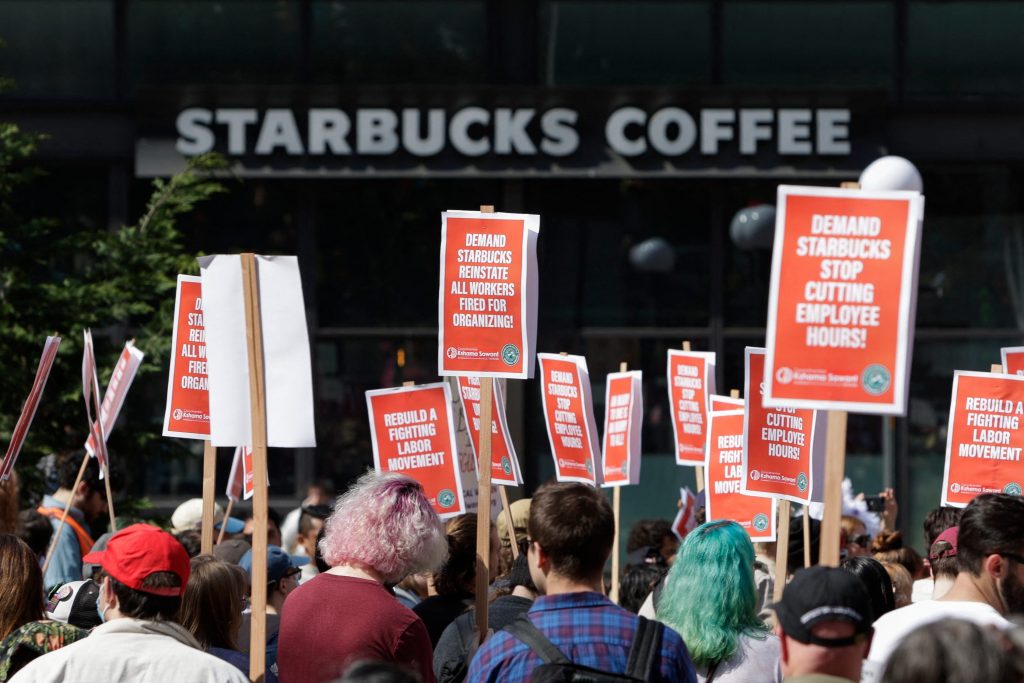- The NLRB has accused Starbucks of using "illegal tactics" to deter workers from unionizing.
- This includes closing stores, discharging organizers, and surveilling staff, the NLRB said.
- It wants Starbucks to reinstate seven former workers allegedly fired for supporting union efforts.
The National Labor Relations Board has accused Starbucks of using "illegal tactics" to deter workers from unionizing.
This includes bringing in managers, closing some stores, and discharging seven union activists, Linda M. Leslie, regional director for the NLRB in Buffalo, New York, said in a petition seeking injunctive relief, filed Tuesday.
"After learning about the organizing effort, Starbucks immediately set its vigorous anti-union campaign in motion, employing an expansive array of illegal tactics such as raising wages, promising benefits, bringing in a cadre of managers to monitor employees and discourage union activity, closing stores with active organizing drives, and threatening employees," the NLRB said in a summary of the petition.
Starbucks did not immediately respond to Insider's request for comment about the petition.
"As we have said previously, we believe these claims are false and will be prepared to defend our case," a Starbucks spokesperson told CBS MoneyWatch.
Seven union activists across five stores in Buffalo were discharged over the course of six weeks, the NLRB said, with one of them permanently banned from all Starbucks stores.
The NLRB's Tuesday petition asked the court to order Starbucks to reinstate the former employees, who it said were unlawfully fired for unionizing in an attempt to deter other workers from doing the same.
The filing also alleges that Starbucks promised better benefits and terms and conditions of employment to staff at 12 of its Buffalo stores "if they refrained from union organizational activity."
Starbucks agents at some of these stores promised workers in-person mental health counselling, store renovations, and seniority-based wage increases if they didn't support unionization efforts, the petition claims.
The petition also claims that Starbucks surveilled staff by listening in to their headset conversations, banned them from talking about wages, and got company officials to make "unprecedented and repeated visits" to the stores. Starbucks also "repeatedly" closed the Buffalo stores early "to hold anti-union meetings," which reduced staff's earnings, the NLRB wrote.
The NLRB asked the court to order Starbucks to reinstate the seven former staff members and to reopen a kiosk store in Cheektowaga, New York that it permanently closed.
In an affidavit filed on Wednesday, Leslie wrote that Starbucks' "unlawful conduct" was expected to continue over time and could cause "irreparable harm" to both employees and the union.
"Absent immediate interim relief, Starbucks will achieve its goal, through unlawful means, of irreparably harming the campaign in Buffalo, and sending a clear chilling message to its employees across the country," Leslie said in a statement.
Workers United – the union that the Starbucks stores are organizing with – previously said Starbucks' actions were affecting staff's stance on unionizing. It said that employees at the company's Camp Road store in Buffalo "were subjected to a massive campaign of overwhelming psychological force from the moment they publicly expressed the desire to form a union," which ultimately led to them voting against unionizing.
Starbucks workers in Buffalo first announced plans to unionize last August, citing understaffing, product shortages, and their experiences working during the pandemic. Workers at a store on Elmwood Ave, Buffalo voted to form a union — the first-ever at a corporate-owned Starbucks store in the US — in December.
Union efforts have spread across the US, with more than 150 stores in states including Massachusetts, Georgia, and Ohio voting to unionize.
In May, the NLRB also petitioned for injunctive relief for seven former Starbucks employees in Memphis, Tennessee it said were "unlawfully fired" for organizing.
Starbucks Workers United said the workers were fired in retaliation for organizing and speaking to the media, while Starbucks said they had violated policies, including security measures, by staying in the store after hours and allowing unauthorized people in for the interview after staff appeared to allow a TV crew in the store.
